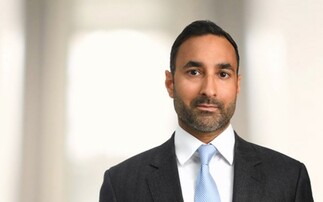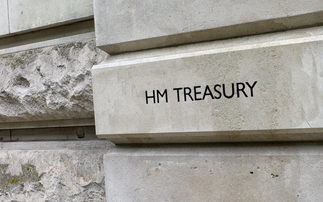With the economic skies darkening, Incisive Works recently attended a briefing by Peter Harvey, veteran manager of the Schroder Strategic Credit Fund, to hear his insights on investing in corporate bonds on both sides of the investment grade border.[1]
The turn of the economic cycle is focusing attention on high yield and lower-rated investment-grade bonds. Some investors fear an economic downturn might lead to a deluge of fallen angels as investment grade BBB bonds are downgraded to BB, perhaps destabilising the high-yield market with its much smaller investor base.
But for Peter Harvey, who launched the £1bn Schroder Strategic Credit fund in 2006, the BBB/BB borderland remains the sweetest spot in the corporate bond market because firms "have some leverage but not crazy levels of debt". The fund holds a flexible combination of high yield and investment grade debt with a focus on European companies. Harvey says the fund's sharpest competitive edge is in the BB segment where it tries to "capture some of the return from non-investment grade but to avoid the bullets."
It's this bullet dodging that differentiates the fund, says Harvey. He explains that the fund's most durable characteristic is that it pursues returns on a risk-adjusted basis, even though for most of the economic cycle, "there are no investment industry medals for that". Other fund managers are sometimes tempted to pile on risk while the going is good to make their reputations.
"It's when you get bond market volatility that our strategy is of most use", he says. That's because the flight of less canny investors means that even the soundest BB-rated borrowers must pay a premium to access capital. Going into the markets in those moments "might look crazy…but it is the best way to generate good risk-adjusted returns", he says, citing December 2018, when many investors temporarily abandoned riskier asset markets including high-yield corporate bonds.
European high-yield credit spreads have spiked three times since the global financial crisis
Source: Schroders, Bloomberg data as at May 2019.
In the run up to the December market volatility, Harvey had been steadily de-risking the portfolio because "spreads had become too low" to ensure a good risk-adjusted return. December then offered a "fantastic buying opportunity" as the fund drew on a war chest of cash and quasi-cash instruments.
The party ended with a rapid high-yield bond market rally. "The feeling that we could have done a little bit more is always a source of annoyance", he says. December 2018 was one of only three such volatility-led opportunities in the last few years.
What if high-yield market hiccups were replaced by more fundamental economic problems? Harvey thinks this is a real concern and that the European economy might be "heading for a rough place". He cites worsening credit fundamentals - "the amount of leverage in the financial system has grown dramatically" - as well as the rise of populism in European politics.
He wonders if one trigger for trouble lies in the boom in collateralised loan obligations, often used to support private equity deals. While the US has seen the most exuberant deals, he counsels that Europe may not be immune from its own brand of unpleasantness.
"It's still possible to find interesting investments but we are operating with caution and with this wider background very much in mind", he says. "For example, we are conservative in Italy and focus on Italian companies that could survive a potential crisis." The only Italian retail bank the fund lends to is Unicredit which, as well as being one of the largest banks in Italy, has significantly better credit metrics than the peer average, says Harvey. "It's the right bank with the wrong address", he says.
One of the fund's habits is to identify sound firms in a spot of bother. Danske Bank is the largest bank in Denmark but has become embroiled in a major Estonian money laundering scandal. However, the fund felt that management had changed sufficiently and stepped in at the maximum point of pain to gain an attractive coupon.
Another habit, says Harvey, is old-fashioned risk management. "We are asked about our value-at-risk (VAR) model but the most important risk management happens at the moment of investment", he says. His team looks for firms and sectors with steady cash flow and revenues and, occasionally, valuable property that could be sold in the event of a problem. "In high yield our preference is for first lien and senior secured notes", he says, "and of course we look to diversify our portfolio, over 14 or 15 sectors."
And while the fund's competitive strength often lies in selecting BB-rated credits, Harvey's team watches both sides of the investment grade border. At the moment, Harvey believes the opportunities in lower-rated investment grade (BBB) are actually higher than in BB. More ominously, he adds that investing more in BBB bonds "also offers a better risk position for going into any European recession".
[1] Peter Harvey was speaking at the Investment Week Conference 2019, 6-7th June 2019, Pennyhill Park, Surrey.
Marketing material for professional investors or advisers only.
Past performance is not a guide to future performance and may not be repeated. The value of investments and the income from them may go down as well as up and investors may not get back the amount originally invested. Exchange rate changes may cause the value of any overseas investments to rise or fall. Schroders has expressed its own views and opinions in this document and these may change. This information is not an offer, solicitation or recommendation to buy or sell any financial instrument or to adopt any investment strategy. Nothing in this material should be construed as advice or a recommendation to buy or sell. Information herein is believed to be reliable but we do not warrant its completeness or accuracy. Any data has been sourced by us and is provided without any warranties of any kind. It should be independently verified before further publication or use. Third party data is owned or licenced by the data provider and may not be reproduced, extracted or used for any other purpose without the data provider's consent. Neither we, nor the data provider, will have any liability in connection with the third party data. The material is not intended to provide, and should not be relied on for accounting, legal or tax advice. Reliance should not be placed on any views or information in the material when taking individual investment and/or strategic decisions. No responsibility can be accepted for error of fact or opinion. The forecasts included in this presentation should not be relied upon, are not guaranteed and are provided only as at the date of issue. Our forecasts are based on our own assumptions which may change. We accept no responsibility for any errors of fact or opinion and assume no obligation to provide you with any changes to our assumptions or forecasts. Forecasts and assumptions may be affected by external economic or other factors. Any references to securities, sectors, regions and/or countries are for illustrative purposes only. Issued in June 2019 by Schroder Investment Management Limited, 1 London Wall Place, London EC2Y 5AU. Registered in England, No. 1893220. Authorised and regulated by the Financial Conduct Authority.












